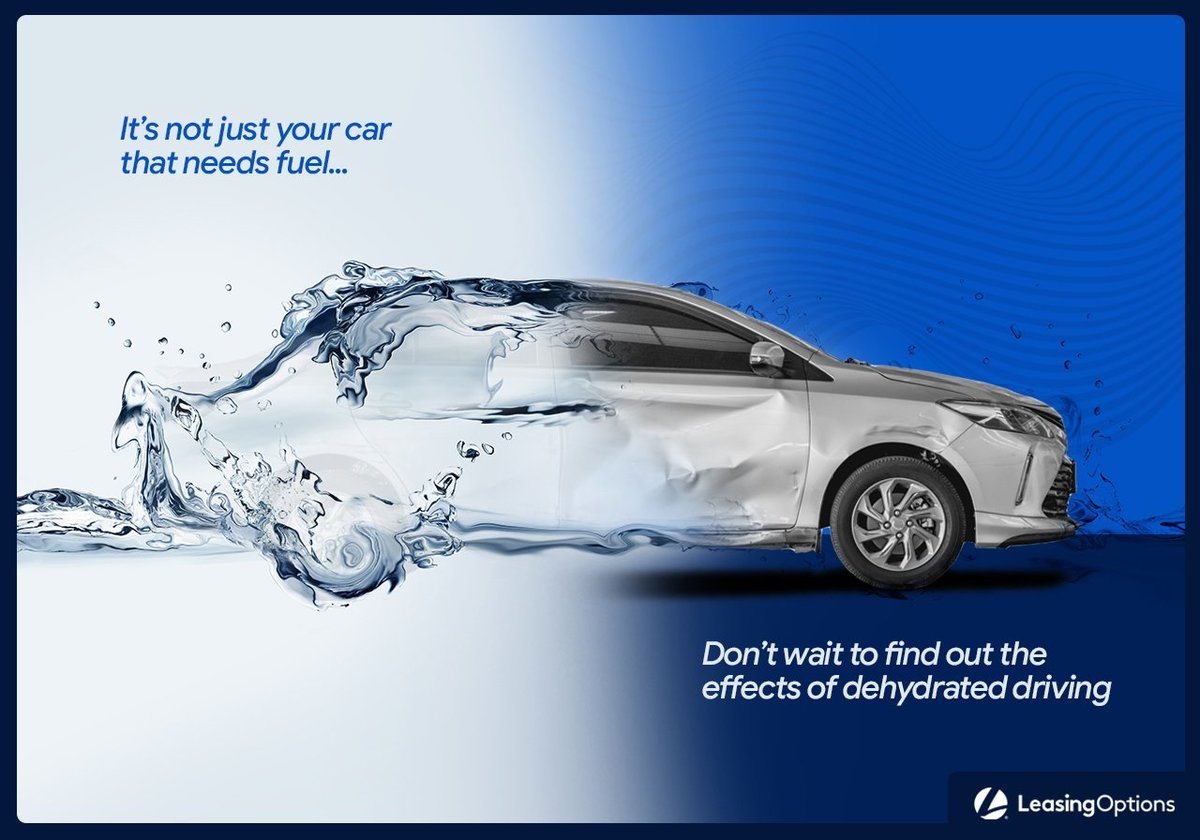Here at Leasing Options, we conducted a survey back in 2015 to find out how much UK drivers knew about dehydrated driving. The results were shocking. Today, we revisit this topic as the country swelters in an early heatwave — which is predicted to last — to give out more guidance on the dangers of dehydration while driving and some top tips on how to prevent it, especially if you have some long road trips or journeys planned this summer.
The Shocking Statistics
Recent studies show that 55% of motorists drink less than the recommended daily water intake, with 43% of drivers admitting to being without the appropriate amounts of drinking water on longer journeys. That’s a scary statistic, especially when you learn that there are 32.9 million cars on the road in the UK, meaning 18.1 million of them are being driven by dehydrated drivers.
How Much Water Should We Be Drinking?
According to a 2021 study by WaterLogic, the average person in the UK only drinks 1.7 litres per day, which is well below the recommended 2.5 litres for males and 2.0 for females.
If you’re embarking on a long journey, where you’ll be on the road for multiple hours at a time, you must remember to either take regular breaks to rehydrate yourself or simply carry some water with you, so you can rehydrate on the move.
The British United Provident Association (BUPA) advise that people should drink about 10 glasses or mugs of fluid a day, to stay hydrated throughout the day. So keep this in mind when travelling.
Why Is Staying Hydrated Throughout The Day Important?
By becoming dehydrated, even to a mild level, our bodies will feel the difference. Studies show that a drop of as little as 1% can impact our body’s functionality, with our cognitive ability and mood becoming hindered.
How Does Dehydration Affect My Driving Ability?
A study by researchers at Loughborough University found that even a mild form of dehydration is the equivalent of being over the limit when calculating errors in driving.
According to the study “mild hypohydration produced a significant increase in minor driving errors during a prolonged, monotonous drive, compared to that observed while performing the same task in a hydrated condition. The magnitude of decrement reported was similar to that observed following the ingestion of an alcoholic beverage resulting in a blood alcohol content of approximately 0.08% (the current UK legal driving limit), or while sleep-deprived.”
These findings are backed up by Jacob Hatch, author and founder of Hydration Anywhere, who states in a recent article that, “Losing 1.5% of water causes impairment in tasks that require focus, motor coordination, and quick decision-making. Loss of concentration is the leading cause of the tragedies in areas that demand high levels of focus.”
Hatch continues in his article to relate the importance of staying hydrated with driving, “Since driving requires a lot of attention, you must take in more fluids than the amount you are losing to prevent disorientation. If you must drive long distances during the hot weather, make sure you have plenty of water in the car and plan for multiple stops ahead of your trip so you don’t skip drinking water to avoid bathroom breaks. These tactics help you focus while driving hence avoid committing common driver errors, which account for 94% of car crashes”.

Symptoms of Dehydration and Its Impact on Driving
If you are dehydrated, you will likely experience one of these symptoms below and they could have a big impact on your driving ability.
-
Tiredness
-
Dizziness and/or lightheadedness
-
Muscle cramps
-
Loss of focus/concentration
-
Headaches
Causes, and Those with Increased Susceptibility, of Dehydration
Did you know that some people are more susceptible to dehydration than others? It’s true. Check this list below, and if one or multiple of these relates to your current state, it’s vital to maintain or elevate your hydration levels when driving.
-
Suffer from diabetes
-
A recent bout of vomiting and/or diarrhoea
-
Too much exposure to the sun (heatstroke)
-
Have alcohol in your system
-
High level of sweating post-exercise
-
Have a high temperature (38C or more)
-
Are on medication
-
Suffering from back pain
Dehydration Can Cause Back Pain?
Yes, that’s correct. According to Atlantic Brain & Spine, “dehydration can cause back pain when the gelatinous material inside your discs lose water and are unable to hold the weight of your body, this causes the disc to collapse which can put pressure on the sensitive nerves exiting the spinal column.”
So if you have been, or had a spell of long journeys and are suffering from back pain, it may be that you’re dehydrated!
Avoiding Dehydration While Driving
Here are few things to keep in mind when you’re taking a road trip or need to travel long distances.
-
Drink water before your journey
-
Keep a water bottle handy
-
Take regular breaks
-
Avoid excessive air-conditioning usage, as this can have a drying effect on the atmosphere.
Mike from Leasing Options
“When starting your car, ready for the morning commute, you may not think drinking an extra glass of water before leaving the house would affect your driving abilities, but you would be wrong.
“Showing caution and drinking more water will not only have a positive effect on the body but will also ensure motorists stand a far greater chance of reaching their destination safe and well,”